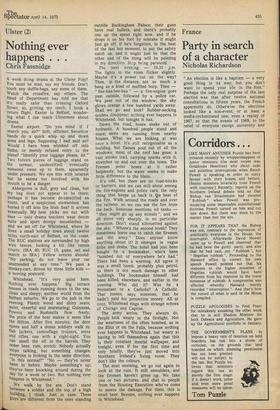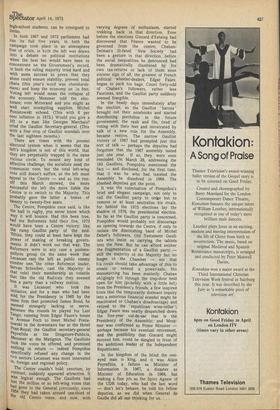France
Party in search of a character
Nicholas Richardson
"An election is like a baptism — a very good thing in its way, but you don't want to spend your life in the 'font." Perhaps the only real surprise of the last election was that after twelve national consultations in fifteen years, the French apparently do. Otherwise the elections looked like a non-event, or at least a media-orchestrated one; even a replay of 1967, so that the events of 1968, to the relief of everyone except university and high-school students, can be consigned to limbo, In both 1967 and 1973 parliament had run its full five years, in both the campaign took place in an atmosphere free of crisis, in both the left was drawn into a debate on political institutions When the best bet would have been to Concentrate on the Government's record, in both the ruling majority tried hard and With some success to prove that they alone could ensure stability, prevent total chaos (this year's word was chambardemerit) and keep the economy on :ts feet. Voting left would mean the collapse of the economy, Messmer told the electorate; vote Mitterand and you might as Well start stockpiling supplies, Michel Poniatowski echoed. (This with 6 per cent inflation in 1972.) Would you give a lift to a man like Georges Marchais? cried the Gaullist Secretary-general. (This With a fine crop of Gaullist scandals over the last eighteen months.) There are times with the present electoral system when it seems that the left's kingdom is not of this world, that they are perpetually trapped in the same vicious circle. To mount any kind of effective challenge, the socialists need the Communist vote, but the total left-wing vote still doesn't suffice, so the left must appeal to the Centre — and as the runoff this March showed, the more successful the left the more liable the Centre is to switch to the Majority. This Probably gave the latter a bonus of twenty to twenty-five seats.
The Centre, Pompidou once said, is like the ball in rugby, you never know which Way it will bounce. Had this been true, had the Reformers held their fire, 1973 Would have been a Centre victory: like the rump Gaullist party of the mid'fifties, they could at least have kept the Power of making or breaking govern ments. It didn't work out that way. The Reformers were in any case a pushme Pullyou group (in the same week' that Lecanuet cast the left as public enemy hUmber one, the other Reformist leader, Servan Schreiber, cast the Majority in that role) their membership so volatile that like the old Radicals they seemed less a party than a railway station. It was Lecanuet who took the initiative, and for a man who had been sold for the Presidency in 1965 by the same firm that promoted James Bond, he seemed strangely lacking in nerve. Between the rounds he played his Last 1.: a/Igo, running from Edgar Faure's house I n Avenue Foch to ineet Michel Ponia towski in the downstairs bar at the Hotel Pont-Royal, the Gaullist secretary-general Peyrefitte at the Drugstore-Publicis, Messmer at the Matignon. The Gaullists took the votes he offered, and promised nothing in return — indeed Pompidou specifically refused any change in the tIN'o sectors Lecanuet was most interested in, foreign and regional policy.
The Centre couldn't hold: centrism, by Contrast, suddenly appeared attractive. It Was logical enough. The Gaullists had .lost the million or so left-wing votes that Lhad gone to the General previously; since 1958 they had taken around one-third of the old Centre votes, and now, with varying degrees of enthusiasm, started trekking back in that direction. Even before the elections Giscard d'Estaing had discovered that France wanted to be governed from the centre; ChabanDelmas's ill-fated 'New Society' had been a gesture in that direction, before the social inequalities he denounced had been dramatically illustrated by his own tax-returns or lack cf them: most sinister sign of all, the greatest of French political wheeler-dealers, Edgar Faure, began to pack his bags. Count forty-odd of Chaban's followers, rather less Fauristes, and the Gaullist party suddenly seemed frangible.
In the heady days immediately after the election, as the Gaullist ' barons' brought out their notebooks and started distributing portfolios in the future government, the rank and file, tired of voting with their feet and intoxicated by talk of a new role for the Assembly, became restive. The narrow Gaullist victory of 1967 had prompted just this sort of talk — perhaps the deputies had forgotten that the 1967 assembly lasted just one year. If so, they were soon reminded. On March 28, addressing the 183 Gaullists, Pompidou mentioned the fact — and disclosed, for the first time, that it was he who had insisted the Assembly be dissolved in 1968. The abashed deputies got the point.
It was the culmination of Pompidou's brief and elegant campaign, not only to call the Gaullist party to order but to remove or at least neutralise his rivals, for behind the 1973 elections lay the shadow of 1976, the presidential election. So far as the Gaullist party is concerned, Pompidou would probably not discourage an opening towards the Centre, if only to isolate the diminishing band of Michel Debit's followers, Old Testament Gaullists who insist on carrying the tablets into the New. But he can afford neither the fragmentation of a Gaullist party — still the majority of the Majority but no longer of the Chamber — nor that his rivals should take advantage of this to create or extend a power-sale. His manoeuvring has been masterly. Chaban ob:igingly fell through the trap-door held open for him (possibly with a little he!7 from the President's friends, a few inspired hints that the temporarily dormant inquiry into a notorious financial scandal might be reactivated to Chaban's disadvantage) and retired to the ' republican wine-cellar '; Edgar Faure was neatly despatched down the five-year cul-de-sac that is the Presidency of the Assembly; and Messmer was confirmed as Prime Minister — perhaps because his eventual retirement, and the possibility that Giscard might succeed him, could be dangled in front of the ambitious leader of the Independent Republicans.
In the kingdom of the blind the oneeyed man is king, and it was Alain Peyrefitte, a failure as Minister of Information in 1967, a disaster as Minister of Education in 1968, but making a fine job as the Spiro Agnew of the UDR today, who had the last word — don't let's behave, he told his fellow deputies, as we did when General de Gaulle did all our thinking for us. . . .



































 Previous page
Previous page